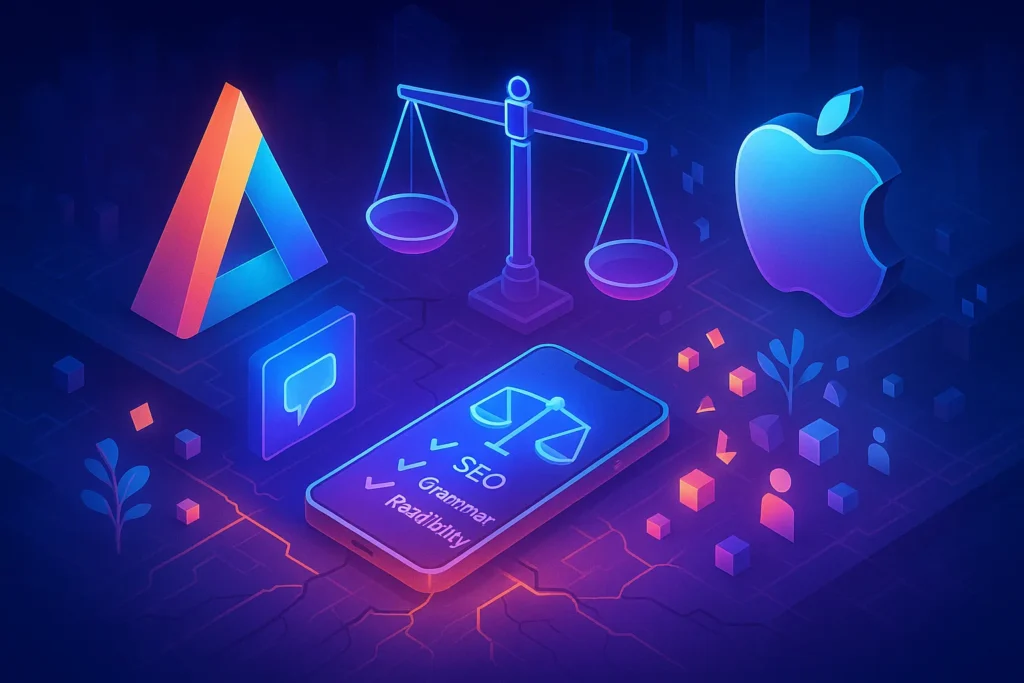🌍 Intro: Why 2025 Became the Breaking Point
For years, regulators have debated whether the world’s biggest technology companies have become too powerful. By 2025, those debates have crystallized into court cases, investigations, and sweeping legislative proposals. Google, Amazon, and Apple — along with other giants — now face unprecedented legal pressure. These antitrust showdowns are not simply about fines or penalties; they are about rewriting the rules that govern digital competition. The outcomes could alter everything from how search engines rank results to how app stores operate and how e-commerce platforms treat sellers. For readers of NerdChips, the story matters because it shapes the ecosystem in which every app, device, and service will live for the next decade.
⚖️ The Push Against Monopolies
The momentum for stronger enforcement has been building globally. In the United States, the Department of Justice and Federal Trade Commission have sharpened their focus on platform dominance, with ongoing suits against Google’s advertising empire and Amazon’s alleged marketplace self-preferencing. In Europe, the Digital Markets Act has given regulators stronger tools to force compliance, with Apple’s App Store policies and gatekeeping practices already under fire. Asia is not standing still either; in India, investigations into predatory pricing and data favoritism have widened, echoing earlier moves in China against local tech titans.
The push is clear: regulators believe that unchecked consolidation stifles competition, locks in consumers, and raises barriers for startups. For companies that once thrived on the narrative of being disruptors, they are now cast as entrenched incumbents standing in the way of disruption itself.
The political climate has also shifted. What once seemed like an obscure policy battle now resonates with everyday consumers frustrated by rising digital costs, opaque algorithms, and limited platform choice. Just as the Big Tech Antitrust: What It Means for the Future of Tech Giants article on NerdChips highlighted earlier, these cases are less about punishing companies and more about re-engineering the ecosystem to foster real competition.
🏛️ The Google Case
No company illustrates the tension between innovation and monopoly power quite like Google. In 2025, the primary focus is on its ad technology stack. Regulators argue that by controlling search ads, display networks, and key ad exchanges, Google effectively operates as both referee and player. This dual role gives it an outsized influence on digital advertising markets worth hundreds of billions annually. The case goes beyond dollars — it is about whether one company should have the power to dictate how information flows online.
If courts rule against Google, remedies could include breaking up parts of its ad business, forcing interoperability, or even requiring divestitures. For consumers, such a move could bring new competition, potentially lowering ad costs that filter down into product prices. For publishers and smaller platforms, it might mean a more level playing field to monetize content without being tied so heavily to Google’s infrastructure.
📦 Amazon in the Crosshairs
Amazon’s marketplace is both beloved and feared. Regulators now accuse the company of leveraging its control over sellers to promote its own products, collect unfair fees, and nudge consumers toward preferred choices. Small businesses have testified that competing on Amazon sometimes feels like “paying rent to a landlord who also sells a nearly identical product next door.” In 2025, lawsuits in both the U.S. and Europe seek to force Amazon to unbundle its logistics services and stop practices that critics say exploit sellers’ dependency.
For consumers, a breakup or mandated changes could mean more transparency in product rankings, fairer treatment of third-party sellers, and possibly new alternatives to Prime’s lock-in ecosystem. But there are risks too: disruption could raise short-term costs or reduce convenience if the platform’s seamless integration fractures. The stakes are nothing less than the future of online shopping itself.
🍏 Apple’s Walled Garden Under Scrutiny
Apple’s App Store remains one of the most profitable distribution channels in the world, and in 2025 regulators continue to question whether its control is anti-competitive. The crux of the issue lies in Apple’s 30% commission on in-app purchases and its restrictions on alternative payment systems. Developers argue that Apple extracts rent while stifling innovation, while Apple maintains that the closed ecosystem ensures security and privacy for users.
Antitrust cases in Europe and Japan could force Apple to open iOS to competing app stores or alternative payment providers. If that happens, the iPhone experience — long known for its controlled uniformity — could shift dramatically. For developers, the implications are enormous: more freedom, lower costs, and new distribution opportunities. For Apple, however, it risks losing billions in recurring revenue and ceding some control over its famously curated ecosystem.
Want More Smart AI Tips Like This?
Join our free newsletter and get weekly insights on AI tools, no-code apps, and future tech—delivered straight to your inbox. No fluff. Just high-quality content for creators, founders, and future builders.
100% privacy. No noise. Just value-packed content tips from NerdChips.
🔍 Broader Impacts on Innovation
Beyond individual companies, the antitrust battles raise big questions about the tech industry as a whole. Will breaking up giants unleash a wave of startup innovation, or will it weaken platforms that consumers have come to rely on? If Google’s ad stack fragments, who will step in to provide reliable alternatives? If Amazon loosens its grip, will smaller e-commerce platforms finally scale? If Apple is forced to open iOS, will consumers actually take advantage of new payment systems, or will most remain loyal to Apple Pay out of convenience?
These cases are not just about punishing companies; they are about reimagining the rules of digital capitalism. At NerdChips, we’ve already explored how antitrust frameworks influence emerging fields like AI regulation and chip manufacturing. The outcomes of 2025 could set precedents that define how those sectors evolve too.
🌐 Looking Ahead
The road ahead is anything but certain. Court cases take years to resolve, appeals can drag on, and companies have powerful legal teams prepared to defend their empires. Yet the momentum has shifted. Politicians, regulators, and even public sentiment have aligned in ways that were rare a decade ago. Whether the result is full breakups, hefty fines, or incremental concessions, the message is clear: Big Tech’s era of untouchable dominance is over.
For businesses, the implications are profound. Partnerships, marketing strategies, and supply chains that rely on these platforms may need to adapt quickly to new rules. For consumers, the outcomes could open the door to more choice, lower costs, and fairer ecosystems — though the transition may come with growing pains. One thing is certain: 2025 will be remembered as the year when the world’s most powerful tech firms faced their most serious reckoning yet.
🤖 AI and Antitrust: The New Battleground
Antitrust in 2025 isn’t just about retail platforms and app stores—it’s about the infrastructure of artificial intelligence. Regulators are starting to ask whether cloud computing resources, proprietary models, and partnerships are creating AI monopolies. Microsoft’s close ties to OpenAI have already raised questions about preferential access to Azure’s massive GPU clusters. Google’s bundling of Gemini AI services into its ad and productivity tools has regulators exploring whether it unfairly stifles independent AI startups.
This is where the Big Tech’s AI Arms Race and AI Regulation on the Rise intersect with antitrust law. If AI becomes the defining technology of the next decade, the question is not only “who builds the best models?” but also “who controls access to the infrastructure?” Courts could impose conditions that level the playing field, making it easier for smaller firms to compete in training and deploying AI. For users, this could mean more diverse AI tools and lower costs, rather than being locked into one company’s ecosystem.
Ready to Build Smarter Workflows?
Explore AI workflow builders like HARPA AI, Zapier AI, and n8n plugins. Start automating in minutes—no coding, just creativity.
🔍 Global Perspectives & Chip Supply Connections
While the U.S. and EU dominate headlines, other regions are not standing still. China continues to regulate its domestic tech giants with heavy hand, from Tencent to Alibaba, often for political as much as competitive reasons. Japan and South Korea are also considering frameworks to ensure their domestic firms are not squeezed out by American platforms.
Meanwhile, the global chip supply chain plays a subtle but crucial role. The Global Chip Shortage Update reminds us that whoever controls hardware access—whether GPUs for AI or processors for smartphones—holds a competitive advantage. Regulators are beginning to recognize that antitrust in 2025 is not only about apps and ads but about who gets to access scarce computing resources at scale.
🧠 Nerd Verdict
From a NerdChips perspective, the antitrust showdowns of 2025 are less about dismantling giants and more about rebalancing the tech ecosystem. These cases will not kill innovation; they will likely shift it. If handled wisely, regulators could unlock a new wave of competition while preserving the benefits of scale that consumers enjoy. But if handled poorly, the risk is a fractured digital world where convenience and reliability give way to confusion. For professionals, creators, and startups, the best strategy is to stay informed, remain flexible, and be ready to seize opportunities in whatever new order emerges.
❓ FAQ: Nerds Ask, We Answer
💬 Would You Bite?
If regulators succeed in forcing Big Tech to open up, would you welcome a more competitive ecosystem even if it means short-term disruption? Or do you prefer the convenience of tightly integrated platforms?



